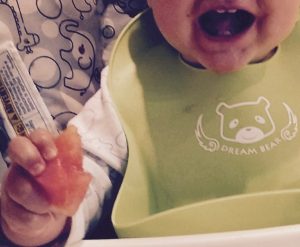
My baby started eating rice cereal and pureed food several months ago, but only within the past several weeks has he been eating finger foods as well. Watching him experience food in all its textured, flavorful, chewy glory has been delightful to witness: He seems genuinely amazed and proud to be able to touch the food on his high chair tray with his very own fingers. He also seems to find great fulfillment and purpose in diligently practicing his pincer grasp, whereby he – increasingly successfully – attempts to bring the morsels of food, accompanied by several fingers that often seem to have wiggly lives of their own, to his mouth. This arrival of any food/fingers to his mouth is often celebrated by a broad, open mouthed, toothy “hippo” grin such as completely melts my heart. There truly is no one else with whom my husband and I would rather share our meals, or our days.
One of baby’s most unbridled expressions of joy so far during this finger foods process came about when I gave him a piece of watermelon several days ago. I was eating watermelon with my own lunch, and as he was watching me very intently, I offered him a piece of his own. He immediately broke out in an eager smile, then proceeded to open his hands wide in excitement. Soon, he began to use his fingers to explore the cold, juicy texture while giving the sound he often makes when excited – a little “huh” chuckle that is often accompanied by smiles and sometimes even by flapping arms alternating with the tensing of his arms and legs as he squeezes out his excitement. He used his ever-improving pincer grasp to bring the juicy melon to his mouth, said melon which he then sucked on, took out of his mouth to again look and laugh at, returned to his mouth to suck and chew on, and even eventually swallowed (or at least partially swallowed). By the end, he was still full of smiles and laughter, and his adorable face and little hands – as well as his highchair, bib, and everything else within reach – were covered in pink, juicy, sticky evidence of the watermelon he had so loved.
As is often the case, getting to see the way in which my baby delights in the world around him encourages me to see and reflect upon the world in new ways myself. His enjoyment of food –especially watermelon! – is no exception. Witnessing his experience with watermelon leads me to wonder about food as God originally intended it to be. As everything that God created was good (Genesis 1:31), I imagine food is no exception. Not only did God originally create human beings as good, and food as good, he made human beings with taste buds to register the delicious goodness of food – and as far as I can tell this is not something that God had to do (as I’m sure he could have thought up other ways to ensure people partook of enough energy to sustain life). And yet he did! And the fact that he did can and does bring us great joy and fellowship, even as I got to experience as I ate lunch with my dear little baby. As an aside, this reminds me of a professor at my undergraduate institution who had a heart that was especially worshipful; one of his sermons included an exhortation to take time to truly look at the world around us – an example of which included the amazing complexity of taste buds – for if we truly do so, we will not be able to help but be moved to worship God. This makes me inclined to think that enjoying watermelon together, or any food, can lead to worship.
I like thinking about how food enjoyed well can lead to worship and can also be a space for fellowship, which leads me to believe food can be life-giving in a literal sense but also in a spiritual and relational sense. I especially appreciate recognizing this goodness of food, as I also know how food eaten for less wholesome reasons or in other ways can be particularly soul deadening. One of the many implications of living life after the Fall (Genesis 3) is that even good things can be grossly distorted, and I think food, including human relationships with food, is no exception. I even think that sometimes food itself can mistakenly become an object of worship, or that relationship with food can take place of relationship with others or even with God. I experienced this for myself in a particularly extreme way in my junior high years when I became anorexic and isolated, and today still notice I can sometimes look to food as a form of comfort or avoidance or indulgence or rest or happiness, or as a way to control, or as a way to “fill” emptiness I may feel in my heart.
Yet seeing my baby enjoy food in a way that I imagine is close to how God originally intended brings me great joy and hope that even in this fallen world the goodness of food can be redeemed – that it can be enjoyed in its rightful place, for what it is, and that it can lead to worship and fellowship and life.